The Vietnam War
Episode 1: Déjà vu
1958 - 1961
Background of French Colonialism in Vietnam
"It was begun in good faith by decent people out of fateful misunderstandings, American overconfidence, and Cold War miscalculation." (ep. 1 00:06:47)
"Before the war was over, more than 58,000 Americans would be dead. At least 250,000 South Vietnamese troops died in the conflict, as well. So did over a million North Vietnamese soldiers and Viet Cong guerrillas. Two million civillians, North and South, are thought to have perished, as well as tens of thousands in the neighboring states of Laos and Cambodia." (ep. 1 00:07:46)
The French attacked and seized Vietnam in the middle of the 19th century.
"The French conquest of Indochina began with an attack on the ancient Vietnamese port of Danang in 1858. It took 50 years to lay claim to the whole region. Laos and Cambodia, as well as the 1,200-mile-long area that would come to be called Vietnam. All of it was ruled by a French govenor-general from his palace in Hanoi. The French largely lived in plantation estates, and in cities, like Saigon, made to look as much as possible like those at home. Most did not even bother to learn the language spoken by their subjects. Instead they installed a series of puppet emperors, and employed a network of French-speaking Vietnamese officials... mandarins... willing to carry out their wishes. The French put their subjects to work building roads and canals, railroads and bridges." (ep. 1 00:10:46)
"In the spring of 1919, as the victorious Allied Powers met in Paris to rebuild the world shattered by the Great War, President Woodrow Wilson headed the American delegation housed in the Hotel Crillon. One day, a tall, slender, 29-year-old man appeared with a petition for the president [that] he and other Vietnamese nationalists had written. Inspired by Wilson's declaration that the interests of colonial peoples should be given equal weight with those of their European rulers, the man was asking that this principle be applied to his homeland. The president's secretary promised to show it to Wilson, but there is no evidence that he ever did. His name was Nguyễn Tất Thành, but he was now living under an alias, Nguyễn Ái Quốc... "Nguyễn the patriot". During his long, shadowy career, he would adopt some 70 different pseudonyms, finally settling on "the most enlightened one"... Hồ Chí Minh." (ep. 1 00:14:24)
Nguyễn Ái Quốc
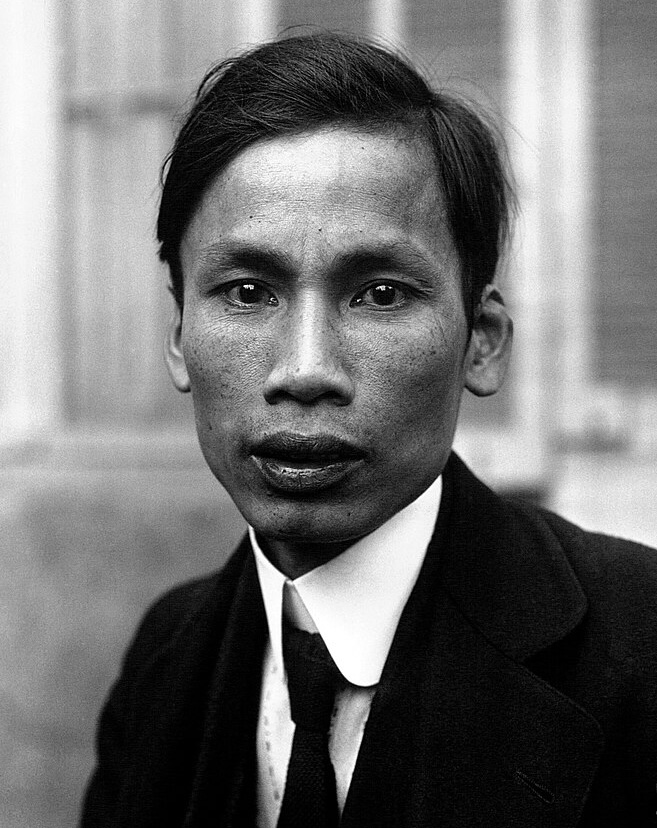
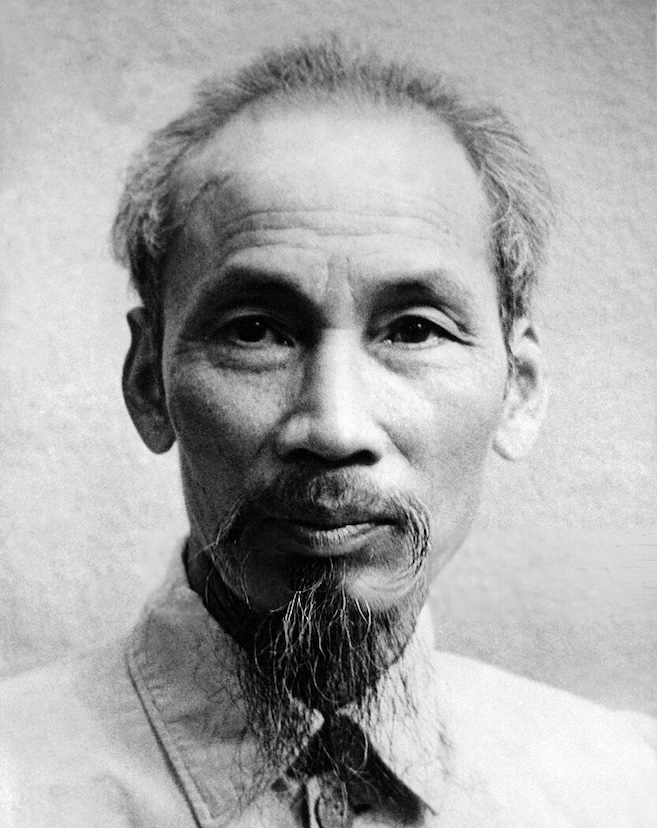
"Hồ Chí Minh was born in 1890, the son of a minor official in the French regime. After taking part in a demonstration against the puppet emperor and the Frenchman who pulled his strings, Hồ was expelled from school and marked for arrest. He left Vietnam and remained in exile for 30 years. He served as a cook's helper aboard a French liner, and visited New York and Boston, where he worked for a time as a pastry chef at the Parker House. He shoveled snow in London, tinted photographs in Paris. There, Hồ Chí Minh joined the French Socialist Party. But when he discovered the anti-colonial writings of Lenin, he became a communist. He was invited to Moscow to study, underwent training as a Soviet agent, was sometimes criticized for being a nationalist first, a communist second, and then was dispatched to China to organize a cell of other Vietnamese exiles and help establish the Indochinese Communist Party." (ep. 1 00:16:10)
Võ Nguyên Giáp
Ngô Đình Diệm & Ngô Đình Nhu
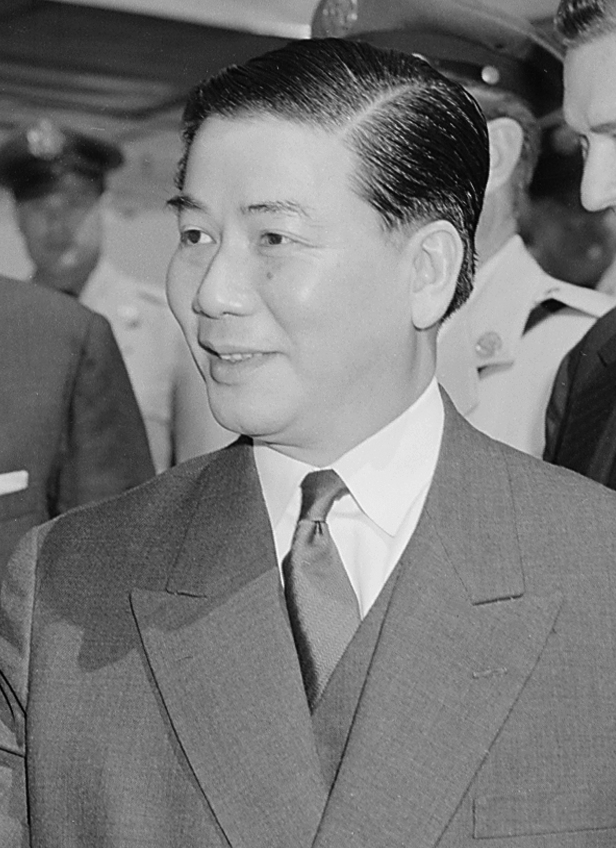
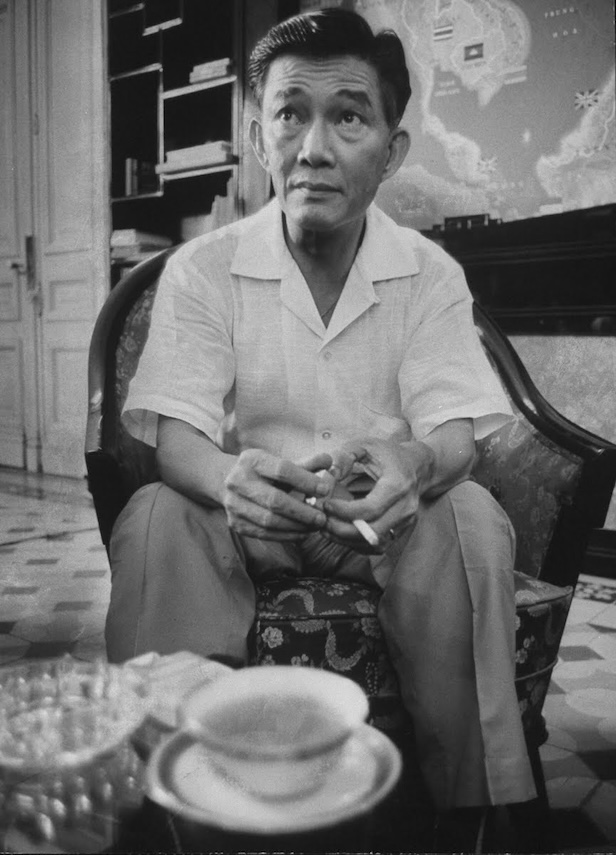
Lê Duẩn
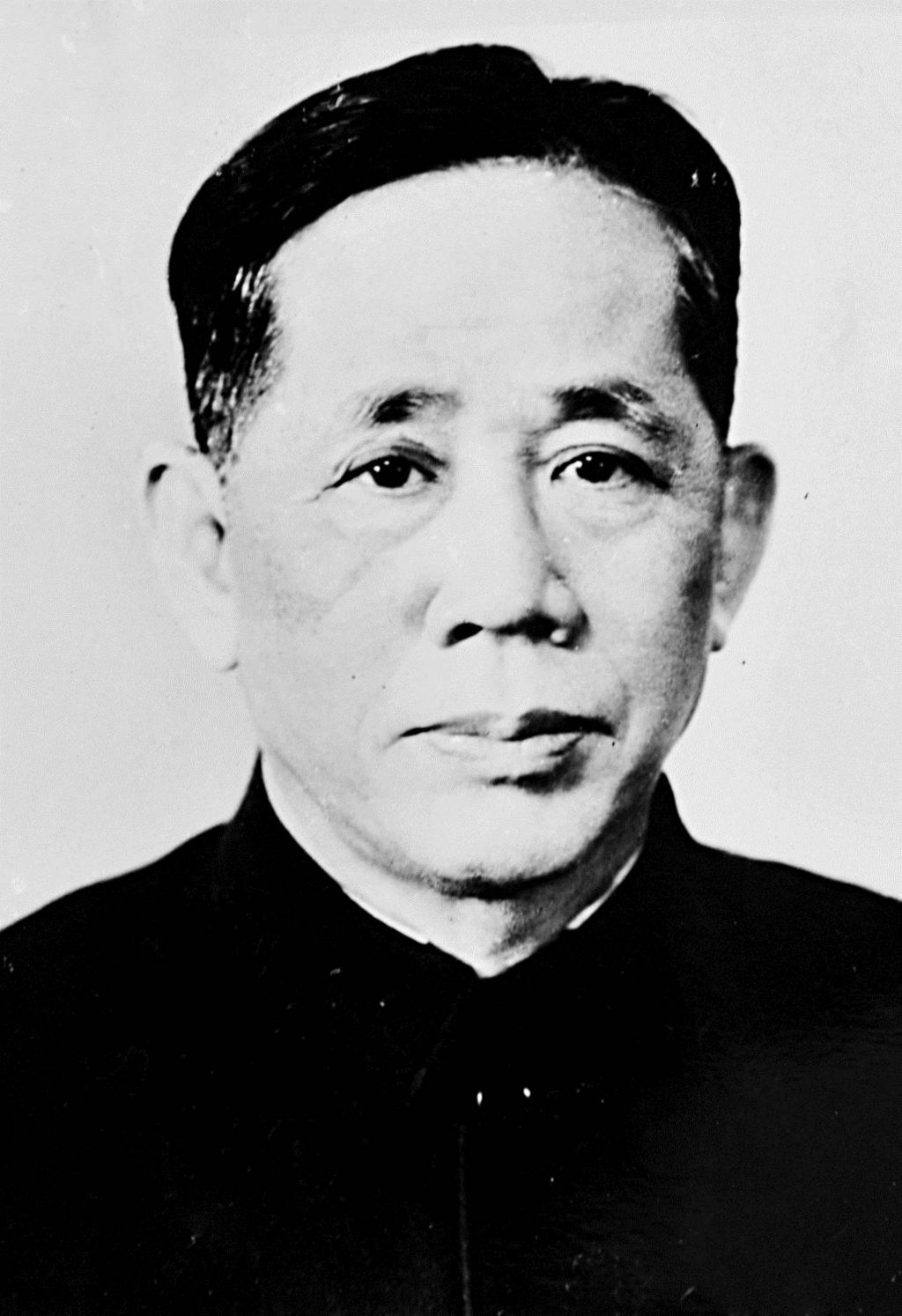
WWII
"By 1940, much of the world was at war again. Germany had siezed most of Western Europe, including France. Imperial Japan threatened many of the European colonies in Asia, and occupied Vietnam, where they permitted their allies, the collaborationist French, to continue to oversee their colony. To some Vietnamese, the coming of the Japanese seemed to signal a welcome end to white colonial rule. But Hồ Chí Minh, still in exile in China, saw the Japanese as alien invaders, no more welcome than the French. They were only interested in exploiting his country and siezing Vietnamese crops to fill their own rice bowls. The time had come, he said, to rally "patriots of all ages and all types, peasants, workers, merchants and soldiers", to defeat the Japanese and the collaborationist French." (ep. 1 00:17:56)
The OSS
| Year | Event |
|---|---|
| 1858 - 1908 | "The French conquest of Indochina began with an attack on the ancient Vietnamese port of Danang in 1858. It took 50 years to lay claim to the whole region. Laos and Cambodia, as well as the 1,200-mile-long area that would come to be called Vietnam. All of it was ruled by a French govenor-general from his palace in Hanoi. The French largely lived in plantation estates, and in cities, like Saigon, made to look as much as possible like those at home. Most did not even bother to learn the language spoken by their subjects. Instead they installed a series of puppet emperors, and employed a network of French-speaking Vietnamese officials... mandarins... willing to carry out their wishes. The French put their subjects to work building roads and canals, railroads and bridges." (ep. 1 00:10:46) |
| 1890 | Hồ Chí Minh was born. |
| 1911 | Hồ Chí Minh left Vietnam. |
| 1919 | Hồ Chí Minh gives a petition regarding Vietnam to President Woodrow Wilson's secretary (with the promise that it would be given to the president), but it never reaches him. "In the spring of 1919, as the victorious Allied Powers met in Paris to rebuild the world shattered by the Great War, President Woodrow Wilson headed the American delegation housed in the Hotel Crillon. One day, a tall, slender, 29-year-old man appeared with a petition for the president [that] he and other Vietnamese nationalists had written. Inspired by Wilson's declaration that the interests of colonial peoples should be given equal weight with those of their European rulers, the man was asking that this principle be applied to his homeland. The president's secretary promised to show it to Wilson, but there is no evidence that he ever did. His name was Nguyễn Tất Thành, but he was now living under an alias, Nguyễn Ái Quốc... "Nguyễn the patriot". During his long, shadowy career, he would adopt some 70 different pseudonyms, finally settling on "the most enlightened one"... Hồ Chí Minh." (ep. 1 00:14:24) |
| Sep 1 1939 | Germany invaded Poland, initiating WWII. |
| Sep 22 1940 | Japan invaded Vietnam. |
| 1940 | "By 1940, much of the world was at war again. Germany had siezed most of Western Europe, including France. Imperial Japan threatened many of the European colonies in Asia, and occupied Vietnam, where they permitted their allies, the collaborationist French, to continue to oversee their colony. To some Vietnamese, the coming of the Japanese seemed to signal a welcome end to white colonial rule. But Hồ Chí Minh, still in exile in China, saw the Japanese as alien invaders, no more welcome than the French. They were only interested in exploiting his country and siezing Vietnamese crops to fill their own rice bowls. The time had come, he said, to rally "patriots of all ages and all types, peasants, workers, merchants and soldiers", to defeat the Japanese and the collaborationist French." (ep. 1 00:17:56) |
| Jan 28 1941 | Hồ Chí Minh returned to Vietnam from China, and set up his headquarters in a cave near the small village of Pác Bó. |
| May 19 1941 | Hồ Chí Minh founded the Vietnam Independence League, the Việt Minh. |
| Dec 7 1941 | Pearl Harbor was attacked by the Japanese. |
| July 1945 | Because the allies wanted to disrupt Japanese presence in Vietnam, they decided to ally with the Việt Minh. American soldiers were airdropped to meet with Hồ Chí Minh, tend to his illness, and arm them. |
| 1944 - 1945 | The famine of 1944-1945. During this time, the Việt Minh would steal rice from Japanese storehouses and distribute it to the starving populace. |
| Aug 6 1945 | An atomic bomb was dropped on Hiroshima, Japan. |
| Aug 9 1945 | An atomic bomb was dropped on Nagasaki, Japan. |
| Sep 2 1945 | Japan formally surrenders. Hồ Chí Minh declares Vietnam's independence. |
| Sep 26 1945 | Lieutenant Colonel Peter Dewey, the US commander of the OSS in Saigon, and who had been doing what he could to help the Vietnamese, was mistaken for a Frenchman by the Việt Minh and killed. |
| Early Oct 1945 | Many more French troops began arriving in Saigon. They quickly regained control of the city and set out to occupy the entire country. |
| Jun 1946 | Hồ Chí Minh returned to Paris to negotiate with France. While Hồ was away, General Võ Nguyên Giáp began consolidating communist control by purging members of rival nationalist parties and anybody who opposed them. |
| Dec 19 1946 | Fighting broke out between the Việt Minh and the French in Hanoi. Hồ and the Việt Minh fled to their mountain stronghold in the North. |
| Aug 29 1949 | Russia successfully tested its first nuclear bomb. The Cold War is happening by now. |
| Oct 1 1949 | Communist forces under Mao Zedong sieze China and delcare the People's Republic of China. |
| Jan 1950 | Mao formally recognized Hồ Chí Minh's insurgency and agreed to provide weapons. The Soviets also recognized the Việt Minh and also offered help. |
| May 8 1950 | US President Henry Truman authorized $23 million in military aid to France. |
| Jun 1950 | Communist North Korea invaded South Korea. Truman ordered thousands of troops to Korea and they pushed N.Korea back North. |
| Jul 1950 | The Truman administration quietly dispatched transport planes and a shipload of jeeps to Vietnam. 35 Military advisors also came. United States was now officially in Vietnam. |
| Oct 1950 | Hundereds of thousands of Chinese troops began pouring into N.Korea, helping them gain ground. As that fighting continued, US military aid to France in Vietnam increased to $336 million. |
| Fall 1951 | Massachusets congressman John F. Kennedy met with Seymour Topping, an American reporter, in Saigon, who convinced him that France was losing. |
| Nov 4 1952 | Dwight D. Eisenhower was elected United States president. At the time, American taxpayers were paying for more than 30% of the cost of the French war in Vietnam. |
| 1953 | France had been fighting for 7 years, they had over 100,000 causualties, and had failed to pacify the countryside. Six commanders had come and gone. French citizens are protesting the war by this time. |
| Jul 1953 | The Korean war ended. |
| Fall 1953 | The French indicated their willingness to begin talks to end the fighting in Vietnam, and Hồ Chí Minh agreed to meet at a later date. |
| Mar 13 - May 7 1954 | The battle of Điện Biên Phủ. It lasted for six weeks. Though America publicly did not support the French in this battle, they covertly sent transport planes. On May 7, the French surrendered. |
| Apr 26 - Jul 21 1954 | The Geneva conference on the situation in Indochina began, and they came to the settlement that Vietnam would be temporarily split at the 17th parallel, with a demilitarized zone inbetween. Troops from both sides had to withdraw to their proper halves of the country. The country would be split until an election could be held to reunify North and South Vietnam. The election was supposed to be held in two years. Over 900,000 refugees fled to the South. France announced their intention to withdraw completely from Vietnam. |
| Apr 27 1955 | President Eisenhower decided to end his support for Diệm's regime, but he soon changed his mind and decided to stick with him after Diệm led an assult on the Bình Xuyên organized crime syndicate and prevailed, taking control of Saigon. |
| Oct 23 1955 | Ngô Đình Diệm was elected leader of South Vietnam. Notably, Diệm won with an implausible 98.2% of the vote, which is widely regarded as the result of electoral fraud. The United States hoped to encourage the building of a legitimate democracy by supporting Diệm. |
| Oct 26 1955 | Ngô Đình Diệm named himself the first president of the new Republic of Vietnam. [He gradually becomes a more ruthless and cruel leader.] |
| 1959 | By 1959, Lê Duẩn and his allies were gaining influence in the North Vietnamese government, and changing its policy. They argued that Hanoi should do everything that it could to help Southern revolutionaries remove Ngô Đình Diệm by force. Small groups of Việt Minh began slipping into Vietnam and causing violence. |
| Jul 8 1959 | At Biên Hòa, 20 miles North of Saigon, six American military advisors were killed by Việt Minh as they were watching a movie. They were the first American soldiers to die by enemy fire in the Vietnam war. |
| Nov 8 1960 | John F. Kennedy was elected president of the United States, with his vice president Lyndon Johnson. His advisors were Secretary of State Dean Rusk, National Security Advisor McGeorge Bundy, his deputy Walt Rostow, special military advisor General Maxwell Taylor, and Secretary of Defense Robert McNamara (who had been president of the Ford Motor Company). All had served in WWII and all believed that ambitious dictatorships needed to be stopped before they became dangerous. |
| Dec 20 1960 | Representatives of Southern revolutionary groups met to form a new organization to replace the Việt Minh, dedicated to overthrowing Ngô Đình Diệm. Lê Duẩn and his allies orchestrated this behind the scenes. The new organization was called the National Liberation Front (NLF). The armed wing of the NLF was called the People's Liberation Armed Forces, but its enemies in Saigon and Washington preferred to call it the Viet Cong. |
Episode 2: Riding the Tiger
1961 - 1963
"Those who foolishly sought power by riding the back of the tiger ended up inside." - John F. Kennedy
| May 11 1961 | Kennedy approved the National Security Action Memorandum 52 (NSAM 52) which significantly increased US support for Vietnam by sending many more miltary advisors and more equipment. |
| Oct 1962 | It was discovered that nuclear missles had been placed in Cuba by the Soviets. Reagan ordered a naval blockade, and after 13 days a deal was struck where Reagan agreed to remove their nuclear weapons from Turkey, and Kurshchev agreed to remove their weapons from Cuba. |
| Jan 2 1963 | The Battle of Ấp Bắc Army of the Republic of South Vietnam (ARVN) forces were ordered to capture a Viet Cong radio transmitter, but they had recieved faulty intellegence, and there were far more Viet Cong guerrillas than expected. South Vietnam suffered heavy casualties, a few Americans were killed or wounded, and 5 American helicopters were destroyed. Highlighted the instability of Southern Vietnamese forces and led to Viet Cong gaining confidence in their ability to face Americans. |
| Jun 11 1963 | At this point, the government of South Vietnam, lead by Ngô Đình Diệm (a Catholic), had been actively oppressing Buddhism, and there were protests against this. On June 11, 1963, Thích Quảng Đức, a Buddhist monk, self-immolated on a busy road in Saigon to protest Diệm's regime. |
| Aug 21 1963 | A few minutes after midnight, during a brief transition between American diplomats (Frederick Nolting & Henry Cabot Lodge) so that none were present, Diệm cut the phonelines of all the senior American officials in Saigon, and then sent hundereds of special forces troops into Buddhist pagodas in Saigon, Hue, and several other Southern Vietnamese cities. Some 1,400 monks and nuns, students and ordinary citizens were rounded up and taken away. Martial law was imposed, public meetings were banned, and troops were ordered to shoot people found on the street after 9:00 pm. Schools were shut down and thousands of students were arrested for protesting. |
| Nov 1 1963 | Troops loyal to South Vietnamese coup plotters siezed key installations in Saigon and demanded Diệm and Nhu surrender. Diệm and Nhu agreed to surrender in exchange for safe passage out of the country, but soon after being picked up in an armored personnel carrier, they were killed. |
| Nov 22 1963 | Kennedy was assassinated, and Lyndon B. Johnson was sworn in as president. |
| May 1965 | Hồ Chí Minh covertley traveled to Beijing in search of more help from the Chinese because the American buildup in South Vietnam alarmed him and his allies. The Chinese promised to equipt and arm tens of thousands of Vietnamese soldiers. Meanwhile, the politburo in North Vietnam directed that every able-bodied man be required to serve in the armed forces. |
| Nov 12 1965 | Pete Hunting, an American volunteer, was killed in a Viet Cong ambush. He was the first American civillian volunteer to be killed in Vietnam. |
Episode 3: The River Styx
Jan 1964 - Dec 1965
| Year | Event |
|---|---|
| Jan 1964 | With US encouragement, general Nguyễn Khánh staged another coup in South Vietnam. |
| Mar 1964 | McNamara was sent to Vietnam to show the people that Khánh was supported by the US. |
| Jul 30 1964 | South Vietnamese ships, under the direction of the U.S. Military, attacked two islands off of the coast of North Vietnam, and the small North Vietnamese navy was put on high alert. |
| Aug 2 1964 | The destroyer U.S.S. Maddox was moving slowly through international waters near North Vietnam on an intellegence-gathering mission in support of further South Vietnamese action against the North, when a North Vietnamese torpedo boat squadron moved to attack it. The torpedos missed, and the Maddox's return fire also missed, but U.S. carrier based planes damaged two of the North Vietnamese boats and sunk a third. Nobody knows who gave the order to attack the Maddox, but some believe it was Lê Duẩn. The United States responded by warning that any further unprovoked attack would be punished. |
| Aug 4 1964 | American radio operators mistranslated North Vietnamese radio traffic and concluded a new military operation was imminent, but it probably never happened, as the evidence is ambiguous. Hanoi had actually simply called upon torpedo boat commanders to be ready for a new raid by South Vietnam. |
| Aug 5 1964 | In response to the attack on the U.S.S. Maddox and the alleged second attack, United States jets bombed North Vietnamese torpedo boat installations and oil storage facilities on the coast. |
| Aug 7 1964 | The Tonkin Gulf resolution was passed which gave president Johnson the authority to increase U.S. involvement in the Vietnam war. |
| Nov 1 1964 | Viet Cong guerrillas shelled the American airbase at Biên Hòa near Saigon, killing 5 Americans, wounding 30, destroying 5 B-57 bombers, and 15 more were damaged. |
| Dec 28 1964 - Jan 1 1965 | The Battle of Bình Giã Viet Cong soldiers easily overwhelmed the village militia and occupied Bình Giã in South Vietnam. After South Vietnamese soldiers were helicoptered in to fight back, 5 Americans had died, 32 Viet Cong bodies had been left on the battlefield, 200 South Vietnamese were killed, 200 more were wounded. The battle made it clear that North Vietnam was capable of assembling large forces. |
| Feb 6 1965 | A U.S. helicopter at Pleiku was struck by North Vietnamese guerrillas. Eight American advisors were killed, over 100 were wounded. Johnson immediately approved a strike on an army barracks. |
| Feb 10 1965 | The Viet Cong blew up a hotel in Quy Nhon, killing 23 Americans and wounding 21 more. Johnson ordered another airstrike. |
| Mar 2 1965 | Operation Rolling Thunder began, where the United States began a systematic bombardment of targets in North Vietnam, meant to boost morale in the South and lower it in the North. The hope was that eventually, North Vietnam would call to negotiate. The president insisted on strict secrecy, the American people were not to be told. |
| Mar 8 1965 | 3,500 U.S. Marines were sent to Vietnam to secure the Da Nang Air Base. |
| Mar 14 - 15 1965 | Approximately 2,000 more U.S. Marines were sent to Vietnam, and they were to actively engage in combat. |
| Apr 7 1965 | President Johnson gave a speech at Johns Hopkins University in an effort to persuade the world of the United State's good intentions in Vietnam. He did not mention the additional Marines sent to Vietnam. |
| May 1965 | By then, the Viet Cong, supported by thousands of regular North Vietnamese troops, were destroying the equivilant of a South Vietnamese batallion every week. South Vietnam seemed weeks from complete collapse. The Soviet Union and China began sending much more support to North Vietnam around this time. |
| Jul 28 1965 | Johnson ordered the deployment of 50,000 more U.S. troops and pledged another 50,000 by the end of 1965. |
| Aug 5 1965 | CBS News broadcasted live from Vietnam showing U.S. soldiers searching a village for caches of weapons and food meant for supporting the enemy, and then burning the village down with lighters and flamethrowers. |